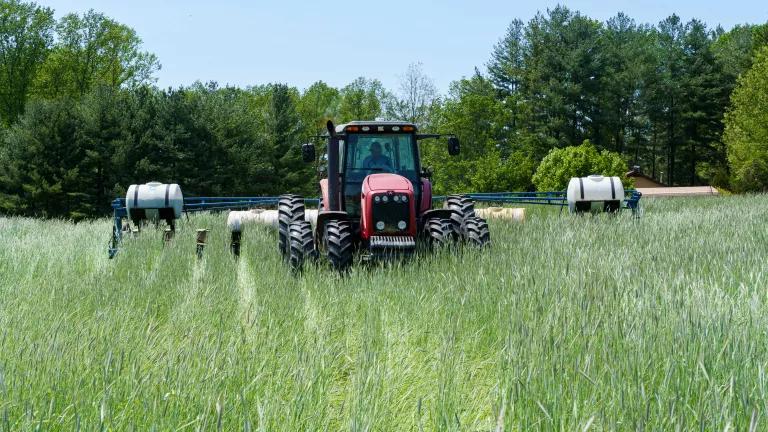Aramark’s Failing Grade on Climate-Healthy Menus
As one of the largest servers of meals in the country, the company is poised to make a significant impact by cutting the volume of meat it purchases each year. Unfortunately, it has made very little progress toward cutting the climate footprint of the meals it serves in its cafeterias.

A student protesting outside Aramark’s annual shareholder meeting in Philadelphia, January 29, 2020
NRDC
Livestock production is a major source of global warming pollution across the globe. In fact, the United Nations estimates that producing meat and dairy is responsible for more than 15 percent of global greenhouse gas emissions. That is equal to the amount of pollution generated by the transportation sector!
Recognizing the importance of reducing this pollution in the fight against climate change, experts recommend a shift away from climate-intensive in our diets. That means cutting the volume of meat and dairy we consume and buying more plants. While the average consumer can do his or her part to make this shift, the food industry must also do its part.
Aramark is one of the largest servers of meals in the country, providing breakfast, lunch and dinner to millions on colleges, corporate campuses and sports arenas each year. As such, the company is poised to make a significant impact by cutting the volume of meat it purchases each year.
Despite ongoing engagement over years, and an announcement that it will set measurable targets to reduce its emissions, Aramark unfortunately has made very little progress toward cutting the climate footprint of the meals it serves in its cafeterias.
Aramark claims it is on track to reduce the beef in its recipes by 12 percent. Unfortunately, these reductions are just on paper. The company cannot show that its purchases of beef or any other climate-intensive product have changed at all. That means that it cannot demonstrate action to reduce the climate impacts its massive food purchases.
The company says that it is in the process of conducting an ‘inventory’ of its emissions to determine where they are coming from. Unfortunately, this accounting is years overdue and the company has not said whether this inventory will lead to a significant cut in its climate pollution caused by the food it serves.
As Aramark’s youngest customers look to a future of rising sea levels, increased drought, and fires caused by climate change, they are saying loud and clear: The time for delay on tackling climate change is over. That’s why NRDC has launched a campaign to convince Aramark to take immediate action to heed the call of experts and cut the climate footprint of its menus. We have issued a ‘Climate Healthy Menus Report Card’ that gives the company grades of F- for its actions to date. We urge Aramark to take immediate action and move up to an A.
The company should start by issuing a strong company-wide commitment to reduce the global warming associated with its food by 20 percent; increase the plant-based entrees it serves in its cafeterias to 50 percent; start real cuts in its purchases of climate-intensive foods right away; and report its progress toward reducing emissions to the public. Only real change will save the planet.




